|
|
|

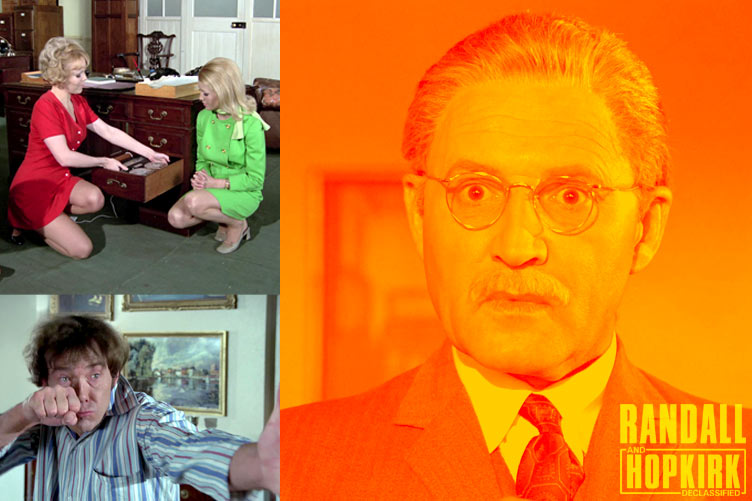
|
Images © ITV Studios, 1969 /
Composition @ Alan Hayes © 2024 |
|
Writers: Mike Pratt and Ian Wilson
Director: Ray Austin |
|
ORIGINAL ITC SYNOPSIS |
|
Talking to a ghost
lands Jeff Randall in hospital for treatment -
and right into the middle of an ingenious plot
to use human 'robots' for remote-controlled
robberies.

Since she is unaware of her
late husband's ghostly presence, Jean Hopkirk is
at a loss to explain the strange behaviour of
Jeff Randall when she and her sister Jennifer
overhear him apparently talking to himself. They
have no idea, of course, that he is actually
conversing with the invisible Marty Hopkirk.
Jean tells Jennifer that
this has been going on for some time, and they
decide to leave a tape recorder running in
Jeff's office. The evidence is conclusive. Jeff
is helplessly speechless when confronted with
the tape by a doctor, Dr. Conrad, who has been
called in by Jean and he finds himself forcibly
confined for treatment in Conrad's nursing home.
After hearing Jean and
Jennifer discussing Jeff's plight, Marty Hopkirk
pays an unseen visit to the nursing home and
watches Dr. Conrad treating another patient,
Leonard Whitty, with hypnosis in order to make
him co-operate in robbing his own home.
Marty conveys this
information to Jeff as a general warning to be
careful, but Jeff, under hypnosis, conveys it
all back to Dr. Conrad! With such a dangerously
accurate case of extra-sensory perception on his
hands, Dr. Conrad decides that there is only one
course of treatment - to edit the ghost right
out of Jeff's mind.
Jean reluctantly gives her
consent to this and now the only key to Jeff's
actions is Dr. Conrad's voice. So, cleverly
mimicking the doctor's voice, Marty directs
Jeff's escape and takes him to Whitty's house,
where another of Conrad's human 'robots', an
ex-prisoner named Smart, is operating as
planned (see Trivia, below).
News of Jeff's escape
immediately arouses suspicion when it reaches
Inspector Nelson because four wealthy men whose
robberies he is investigating have all attended
the same nursing home.
Nelson therefore decides to
investigate the establishment...
|
|
|
PRODUCTION & ARCHIVE |
Production
Code:
RH/DCW/4022
Filming Dates: May 1969
Production Completed: Late Aug 1969
Recording Format: 35mm Colour Film
Archive Holding: 35mm Colour Film |
|
UK REGIONAL PREMIERES |
|
Anglia: Sun 18 Oct 1970, 3.00pm
ATV: Fri 3 Oct 1969, 7.30pm (M)
Border: Fri 23 Jan 1970, 7.30pm (M)
Channel: Fri 3 Oct 1969, 7.30pm (M)
Grampian: Thu 5 Mar 1970, 7.00pm (M)
Granada: Fri 3 Oct 1969, 7.30pm (M)
Harlech: Fri 3 Oct 1969, 7.30pm (M)
LWT: Sun 28 Sep 1969,
7.25pm (M)
Scottish:
Sat 4 Mar 1972, 11.40pm
Southern: Sun 19 Oct 1969,
7.25pm (M)
Tyne Tees: Sun 26 Jul 1970,
9.05pm
Ulster: Fri 3 Oct 1969, 7.30pm (M)
Westward: Fri 3 Oct 1969, 7.30pm (M)
Yorkshire: Fri 3 Oct 1969, 7.30pm (M) |
(M) =
Transmitted in Monochrome/Black and White
(M*) = Transmitted in B/W due to ITV Colour
Strike |
|
CHARACTERS & CAST |
|
Jeff
Randall
Marty Hopkirk
Jean Hopkirk
Jennifer
Doctor Conrad
Doctor Lambert
Inspector Nelson
Leonard
Whitty
Albert Phillips
William
Smart
The Sergeant
Phillip (Male Nurse)
Andrew (Male Nurse)
Hales |
Mike Pratt
Kenneth Cope
Annette Andrι
Judith Arthy
David Bauer
Gerald Flood
Michael Griffiths
William Mervyn
Charles Morgan
Patrick Jordan
Adrian Ropes
Geoffrey Reed
Max Faulkner
Les White |
|
STAND-INS |
Jeff Randall
Marty Hopkirk
Jean Hopkirk |
Harry Fielder
Dougie Lockyer
Tina Simmons |
|
BLU-RAY
RESTORATION |
|
35mm Negative /
Magnetic soundtrack |
|
EPISODE SPECIAL FEATURES |
|
Commentary by actor
Annette Andrι (2005), Commentary by actors Kenneth
Cope and Annette Andrι and Mike Pratt's son, Guy
Pratt (2007), Commentary by director Ray Austin
and Brian Clemens (2007), Production footage
(mute, 1:10), Photo Gallery |
|
ORIGINAL SOUNDTRACK |
|
Music for this
episode was recycled from stock and therefore no
release of a soundtrack of A Disturbing Case
has been issued |
|
|
PRODUCTION CREDITS |
|
An ITC Production
Writers Mike Pratt and Ian Wilson
Series Theme / Musical Director Edwin Astley
Series Creator / Executive Story Consultant Dennis
Spooner
Creative Consultant - Cyril Frankel
Producer Monty Berman
Director Ray Austin |
|
Production
Supervisor Ronald Liles
Director of Photography Brian Elvin
Art Director Charles Bishop
Post Production Philip Aizlewood
Editor John Ireland
Production Manager Malcolm Christopher
2nd Unit Director Jack Lowin
2nd Unit Cameraman Brian Elvin
Sound Recordists Denis Porter and Dennis
Whitlock
Sound Editor Peter Lennard
Music Editor Deveril Goodman
Casting John Owen
Set Dresser Roger Christian
Construction Manager Bill Greene
Camera Operator Val Stewart
Assistant Director Michael Meighan
Continuity Sally Ball
Production Buyer Peter Dunlop
Make-Up Elizabeth Romanoff
Hairdresser Henry Montsash
Costume Supervisor Laura Nightingale
Scenic Artist A. J. Van Montagu
Stunt Co-ordinator Frank Maher
Sound Effects Cinesound
Titles Chambers + Partners
Made on
Location and at Associated British Elstree
Studios, London, England
© Copyright
ITC-INCORPORATED TELEVISION COMPANY LTD MCMLXVIII |
|
|
A DISTURBING CASE
REVIEW |
|
Quite possibly the most enjoyable
episode of Randall and Hopkirk (Deceased) and
it came from the pen of the multi-talented Mike Pratt
and his friend Ian Wilson. The script explores an area
that other writers didn't seem to want to touch - what
happens when those people around Jeff notice that he
is behaving oddly because he can see Marty and they
can't. In other episodes, there are moments of
embarrassment for Jeff that he brushes off or tries to
explain away, but here Jenny and Jean take action to
refer Jeff to a nursing home for his own good. The fact
that he is ultimately put in the care of Dr. Conrad,
the man behind a series of daring robberies could be
described as coincidence or alternatively karma for
Conrad! Judith Arthy gets a second runout as Jenny (in
transmission terms, her first, as this episode serves
as her introduction) and brings an effervesence to her
scenes - she pitches her performance in a more
heightened style than Annette Andrι, but is not a
criticism. It is a shame that the character was
introduced so late in the series as it would have been
fun to spend more time with this distinctive female
duo. David Bauer - a familiar face to ITC fans - is
excellent as Conrad, one of Randall and Hopkirk's
larger than life villains. He strikes a good balance
between menace and humour, which suits this
lighthearted entry to a tee. There's plenty to enjoy
here. One of the very best episodes of the series. No
wonder many of the ITV regions placed it very early in
their runs. |
|
|
A DISTURBING CASE
DECLASSIFIED |
-
Pre-Titles Teaser... A black,
chauffeur-driven limousine parks up outside Albert
Phillips' house after dark. In the back of the car,
Smart checks his watch. They have arrived on time,
doubly evidenced when he hears the distant ringing
of a telephone. Inside, Phillips answers the call
and raises the receiver to his ear. He hears a
strange electronic tone followed by three beeps,
causing him to involuntarily enter a trance. He
answers a knock at the door. It is Smart, who just
strolls in as if he owns the place, briefcase in
hand. Phillips does not react. Instead he silently
leads Smart to the safe and twists the turn dial
back and forth to open it for him. Seated in
Phillips' armchair, Smart watches on intently as
Phillips retrieves the contents of the safe and
places them on the desk. Smart opens his briefcase
and proceeds to sift through the booty. He is
looking for some specific files, which he finds
inside a large manilla envelope which he tears open,
pouring its contents into the case. He is about to
go when he notices Phillips' gold-plated pocket
watch - which ends up slipped into Smart's own coat
pocket. He then blows a whistle and Phillips
autonomically returns the unwanted items to the safe
and relocks it while Smart calls his boss to report
on his successful mission. Smart departs, leaving
Phillips standing like a statue, still hypnotised.
The telephone rings again. Phillips hears another
tone and another three beeps and suddenly awakens. A
voice on the other end of the phone asks for Albert
Phillips. "Speaking," booms Phillips. "246-8090?"
asks the voice. "Wrong number!" Phillips declares,
putting the receiver back in its cradle...
-
Production
Brief...
A Disturbing Case was the
twenty-second episode to
go before the cameras. It was the only episode of
the series to be written by Jeff Randall actor Mike
Pratt and Ian Wilson and the sixth to
be directed by Ray Austin.
-
Ian Wilson was, like his
writing partner, also an actor. He had worked with
Mike Pratt previously on Dave's Kingdom, an
ATV comedy vehicle for Dave King, then a top comedy
and recording star. Mike Pratt wrote for this series
and Ian Wilson acted in it.
-
It would seem that Pratt and
Wilson were not formally commissioned to write this
episode. In conversation with Mike Richardson for
Time Screen magazine, co-creator Dennis Spooner
recalled that Mike Pratt had written a script for
the series "and just put it on my desk". Indeed, he
had kept quiet about it all with his co-stars too,
as Kenneth Cope revealed to Steve O'Brien in SFX
(April 2000): "I was writing for LWT at the time,
sketches and stuff. He didn't even tell me he was
writing [a Randall and Hopkirk]. He was so
shy. He used to closet himself in his dressing room
with his guitar when he had a bit of time off. He
was an exciting man to work with, though." Cope
had earlier spoken to Annette Buckley about A
Disturbing Case, their discussion appearing in
Time Screen (#11, Spring 1988): "Mike wrote
an episode which was very good and it was received
very well. Of course, Michael wrote for the film
Tommy the Toreador as well as composing the song
Little White Bull."
-
Judith Arthy, who had stepped
into the breach when Annette Andrι had been too
unwell to take part in
The
House on Haunted Hill (see Production Brief
for that episode), was asked to film a further
episode alongside Andrι. This was partly designed as
a show of gratitude to the actress, and partly to
make her sudden subsitution in that episode seem
less jarring in terms of the running narrative.
However, Andrι's return meant that Arthy's caption
did not feature in the opening titles for this
episode, though she was credited with the three
regulars at the end of the episode.
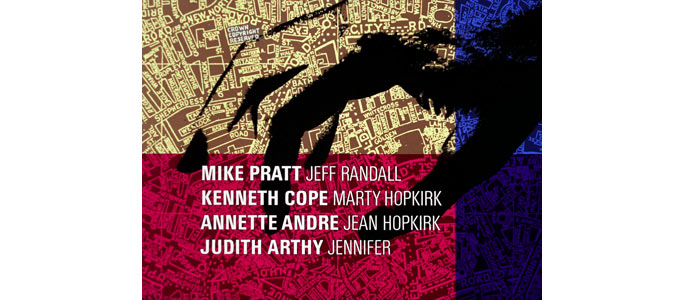
|
Image ©
ITV Studios, 1969 |
|
-
ITC documentation states very strongly that
A Disturbing Case should be transmitted before
The
House on Haunted Hill. When DVD and Blu-ray releases
follow the series' production order, this episode is
indeed usually swapped to precede that episode, as
A Disturbing Case serves as the better introductory
vehicle for Arthy's character. Also, it is revealed
in this episode that Jeff needs reminding who Jenny
is and that he has not seen her for "a
long time", which would stand out as strange were
the episode to follow
The
House on Haunted Hill instead of precede it.
-
A Disturbing Case
witnessed the welcome return of Michael Griffiths as
Inspector Nelson, previously seen in
That's How Murder Snowballs. Confusingly,
the character was given as 'Inspector Nolan' in
publicity materials for this episode.
-
As originally filmed, Kenneth
Cope mimicked Dr. Conrad's vocal delivery when
giving instructions to the hypnotised Jeff Randall.
However, a different choice was made in
post-production, as Cope explained to Annette
Buckley
of Time Screen
magazine (#11, Spring 1988): "The script that
Michael did when they had... me using the
psychiatrist's voice to give him orders - 'Hit him,
Jeff! Hit him!'. It was so funny. The other actor
[David Bauer] dubbed my voice. I was supposed to be
copying him, but he dubbed me. So all that bit with
'Hit him with the right, hit with the left', I said
the lines, but he came along and redubbed it in his
own voice."
-
Brian Elvin returned to his
familiar role as director of photography for this
episode, with one-shot DOP Gerald Moss going back to
his regular position as 2nd unit cameraman.
-
Exact filming dates for this
episode are unknown, but it is believed to have been
filmed in May 1969.
-
A fully edited version of this
episode was completed by late August 1969.
-
On Location...
Aside from sequences that were filmed in Jean
Hopkirk's locality of Maida Vale and very short
hikes to the ABPC Elstree Studios backlot, A
Disturbing Case is based almost exclusively in
and around the picturesque Hertfordshire village of
Letchmore Heath. More details in
Locations: A Disturbing Case.
-
The name on the gates of
Whitty's property is the real-life name of the house
at the location - Aragon. This is unusual in TV
programmes of the time, where real names would
ordinarily be hidden or replaced with fictional
ones. Aragon had featured twice previously in
Department S, in Handicap Dead and The
Bones of Byrom Blain.
-
Haunting Melodies... Edwin Astley was not asked to compose any
new music cues for A Disturbing Case, with
its score coming entirely from stock. There is,
however, an interesting consideration here, in that
the music cue sheets for this episode indicate that
the cues relating to Jeff's actions under hypnosis
were specially recorded - though these were not
recorded by Edwin Astley, at least not specially for
Randall and Hopkirk (Deceased). As such, the
true source of these cues remains mysterious. One
library cue was brought into service in A
Disturbing Case, namely Flute in Desolation
by Robin Stephenson, as the sound with which Dr.
Conrad hypnotised his victims.
-
Seeing Things... A
Disturbing Case received its first UK
broadcast on Sunday 28th September 1969 at 7.25pm when
it aired in monochrome in the London Weekend
Television ITV
region.
-
It was first shown in colour on
ITV on Sunday 26th July 1970 at 9.05pm in the
Tyne Tees region.
-
Trivia... Just two
episodes after
Could You Recognise the Man Again? we have
another episode where the scriptwriters have named a
character 'Hales'. Since the episodes do not have
scriptwriters in common this was most likely a
coincidence.
-
When Leonard Whitty drives up
to the gates of his home, he does so in a vehicle
very similar to Jeff's Vauxhall Victor. In
actuality, it was the Vauxhall Ventora regularly
seen in Department S as the regular vehicle
driven by Stewart Sullivan.
-
Jeff's Vauxhall has been stolen
(by the Department S 2nd unit, no doubt!) so
Jean has promised to lend him her Mini. Marty is
unhappy with this, not least because he still
considers it his car as much as his widow's. After
all, the last time that Jeff borrowed it, just two
days driving and it ended up in a garage with one of
the doors off. Jeff tells him it needed a service.
Later, after Jeff is conditioned by Conrad, Jeff
escapes from the nursing home directed by Marty. In
a trance, he drives to Whitty's under Marty's
instruction. "You see, you can drive a car safely
and quietly. Why don't you drive the car like this
all the time, Mr. Randall," says Marty impersonating
Dr. Conrad's voice.
-
The theft of Jeff's car led to
it being used in a 1.00am robbery at the premises of
Goldhart and Appleby in which valuables worth
£15,000 were stolen. This crime appears to have been
separate to the series of robberies perpetrated by
Dr. Conrad and Smart. Jeff's car was found by the
police and checked over by forensics before being
returned to Jeff.
-
The ITC synopsis of this
episode suggests that Dr. Conrad's cohort Smart
(Patrick Jordan) is an ex-prisoner who is one of
Conrad's "human robots". This idea appears to have
been partly dropped by the time the episode went
before the cameras as Smart is clearly in control of
his actions - an operative of Conrad's rather than
his slave. However, he does have a police record -
Inspector Nelson notes that he is a burglar who
later tried his hand as a conman and that he left
prison three years previously.
-
This episode was used as the
basis for an episode of the Randall and Hopkirk
(Deceased) revival series starring Vic Reeves
and Bob Mortimer. Written by Charlie Higson, it was
produced as You Don't Have To Be Mad To Work Here
in 1999, it was ultimately screened on BBC1 on 25th
March 2000. By this time it had been retitled
Mental Apparition Disorder.
-
Only You, Jeff?
Marty appears to have lost his ability to converse
with hypnotised people, an ability with a 100% hit
rate in
When
Did You Start to Stop Seeing Things? as when
in a trance Leonard Whitty appears not to hear him.
-
When Dr. Conrad conditions Jeff, Jeff can hear Marty
but only if Marty impersonates
Conrad's voice.
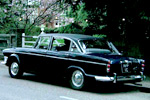 |
1965 Humber Super
Snipe Series V
Registration HPP 1C
Driven by Hales |
|
 |
1964 Austin Mini Super Deluxe Mk I
Registration BAP 245B
Driven by Jean Hopkirk and Jeff Randall
|
Also appeared
in:
Randall and Hopkirk (Deceased) -
'My Late Lamented Friend and Partner',
'You Can Always Find A Fall Guy', 'All Work and No
Pay', 'Never Trust a Ghost', 'Vendetta for a Dead
Man', 'Just for the Record', 'Could You Recognise the Man Again?', 'Somebody Just Walked Over My Grave',
'The Ghost Talks'
Department S - 'The Man from X'
The Saint - 'The Time to Die'
The Persuaders! - 'Greensleeves' |
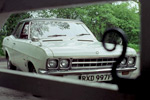 |
1968 Vauxhall
Ventora 3300
Registration RXD 997F
Driven by Leonard Whitty
|
Also appeared
in:
Randall and Hopkirk (Deceased) -
'Money to Burn', 'The Ghost Talks'
Department S - used
extensively in the series (Stewart Sullivan's car) |
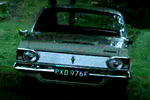 |
1968 Ford
Zephyr Deluxe MkIV
Registration PXD 976F
Driven by Jeff Randall, directed by Marty
Hopkirk |
Also appeared
in:
Randall and Hopkirk (Deceased) -
'My Late Lamented Friend and Partner',
'A Sentimental Journey', 'You Can Always Find A Fall
Guy', 'Who Killed Cock Robin?',
'The Trouble With Women', 'Whoever Heard of a Ghost Dying?', 'Never Trust A
Ghost', 'Vendetta for a Dead Man', 'Somebody Just Walked
Over My Grave'
Department S - 'The
Bones of Byrom Blain' and other episodes |
|
Images © ITV
Studios, 1969 |
-
Seen It All
Before? The backlot facade that doubled as
Albert Phillips home was a familiar sight in ITC
shows filmed at ABPC Elstree at this time. Most
notably it had previously featured in The Saint:
The Time to Kill as Simon Templar's London home.
-
The much-used drawing room and
hallway sets were redressed for A Disturbing Case
to become rooms in Leonard Whitty's home.
-
Jenny (Judith Arthy) wears the
red coat previously worn by Mrs. Roden (Madge Ryan)
in
Could You Recognise the Man Again?
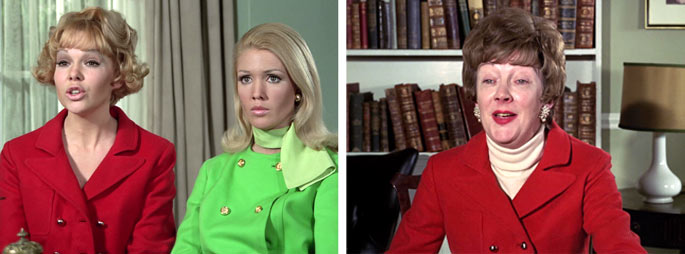
|
Images ©
ITV Studios, 1969 |
|
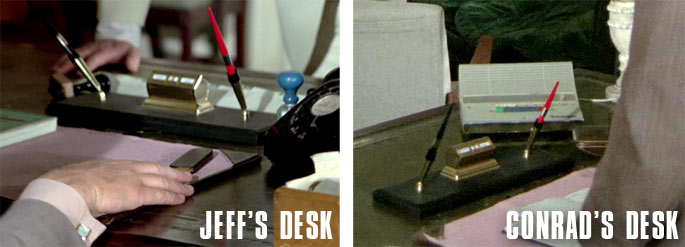
|
Images ©
ITV Studios, 1969 |
|
|
|
-
Cock-ups... At 20 minutes and 41 seconds, nurses
Phillip and Andrew restrain Jeff on a bed at the
Lambert Clinic Nursing Home. Andrew gives Jeff a
sedative with a hypodermic needle while his
colleague holds Jeff down. A close up shows us that
they have pulled back his jacket and shirtsleeve and
the needle hovers over bare skin. The shot cuts to a
wider shot and Andrew delivers the injection through
Jeff's jacket, much further up his arm.
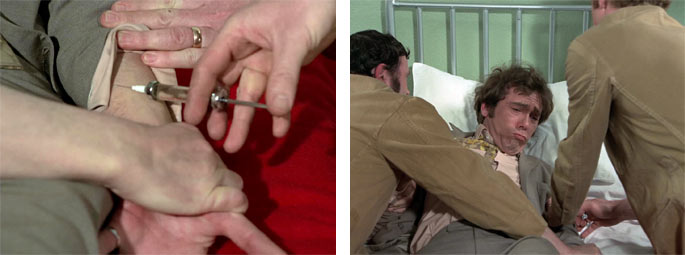
|
Images ©
ITV Studios, 1969 |
|
In the end titles, Charles
Morgan's character, who is referred to in the episode
as Albert Phillips is credited by Chambers +
Partners as Arthur Phillips. Possibly they were
working from outdated information.
-
And Finally... When most people hear the name
Mike Pratt, they'll think of Randall and Hopkirk
(Deceased) if they know of him at all, but Mike
had more than just this string to his bow. A
Disturbing Case proves this to be the case,
since he co-wrote its script with Ian Wilson - no
mean feat, writing one of the most popular and
entertaining episodes of the whole series. Mike had
previously been successful as a songwriter, penning
songs for the likes of Tommy Steele (including
Little White Bull which was a chart hit and
Songwriters Guild Ivor Novello Award winner in
1959). This association and Mike's friendship with
Lionel Bart led to a co-writing credit for him on
the Tommy Steele film The Duke Wore Jeans
(1958) and a music credit on Tommy the Toreador
(1959), again with Bart and Steele. In the early 1960s, Mike speculatively wrote
several stage and television scripts and sent them
to a variety of companies, but none were
commissioned or produced. Mike's acting career, of
course, took off at around this time, but he kept
his hand in his writing, penning a script for
Dave's Kingdom, a 1964 situation comedy starring
Dave King, and another for Pardon the Expression,
a comedy featuring Arthur Lowe as Leonard Swindley,
spun off from Coronation Street. A
Disturbing Case would prove to the final script
of Mike's to enter production, but it's one that proves
that he was just as good a writer as he was an
actor...
Read more about
Mike Pratt in
Who's Who?:
Regulars
Plotline: Scoton Productions / ITC UK
Transmissions by Simon Coward and Alan Hayes
Review by Alan Hayes Declassified by
Alan Hayes
with thanks to Vince Cox, Alys Hayes, Annette Hill, John
Holburn,
Anthony McKay, Mike Richardson and Andrew Pixley
All timings given on this page relate to the Blu-ray editions of this episode |
|
Back to
Programmes Index
Forward to The Ghost Who Saved the
Bank at Monte Carlo
Locations: A Disturbing
Case
|
|
|
Back to Top |
|



